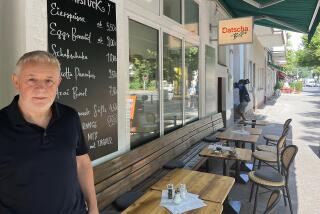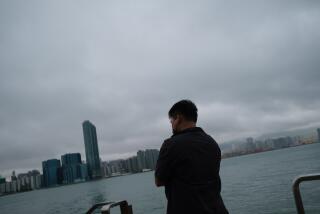WORLD IN A SPIN: FOREIGN STUDENTS REFLECT ON TUMULT : Europe: ‘People were outside their windows . . . singing about freedom.’
- Share via
One night 17 years ago, Wolfgang Klotz swam half an hour from East Germany to a British ship anchored in the Baltic Sea and requested asylum. Since then, Klotz, now a UCLA graduate student, has not returned to his homeland, nor seen his brother or sister. He has not visited with his mother since they arranged to meet in Poland 10 years ago.
But Klotz soon will be reunited with his family. In the wake of recent protests, the resignations of Erich Honecker and other Communist Party leaders, and pro-democracy reforms in East Germany, he purchased a round-trip plane ticket home and the East German government granted him a visa.
“At least I can go home again and be with my family for the holidays,” said Klotz, 34. “The day I bought the ticket, it took me a couple of hours to fall asleep. I kept having flashbacks . . . I could see our house, see the streetcars, and see certain people and buildings. I’m very excited.”
Klotz is not alone among Eastern European students in Southern California. As events unfold in Bulgaria and Czechoslovakia, young people from those nations anxiously await newspapers and newscasts and call home often.
Usually the news is good. When UCLA student Sonia Havlicek, 25, telephoned her parents after top Communist leaders resigned in Czechoslovakia, she said that “for the first time in all these years, my father talked to me absolutely openly about what they hoped would happen.”
Havlicek said her parents told her that “people were outside their windows, throwing snowballs and singing about freedom and asking everyone to come out and join them.”
Despite their optimism, though, some Eastern European students remain unconvinced that democracies will replace the Communist governments in their countries.
“The security apparatus of East Germany is the most extensive in all Eastern Europe,” Klotz said. “If the state wants to change, it’s not so much the (top leadership of the) Communist Party which must get new blood, but the bureaucracy down to the lowest levels.”
Havlicek agreed: “They (the Communist Party) made promises of free elections and several different political parties, but it did not happen yet. Everything has to change inside out, and I think it will take time.”
The skepticism stems from years of personal experience with heavy-handed Communist governments.
Czech authorities, for example, denied Havlicek admission to universities because her father participated in the 1968 Prague Spring protests. She escaped the restrictions by fleeing to the United States and studying biology at UCLA. Still, the Czech government sentenced her, in absentia , to eight months in prison for defecting.
The students said long-simmering anger over repressive measures such as these, catalyzed by successful Polish and Hungarian protests, led to the later uprisings.
“By comparison to other Eastern European countries, the GDR (German Democratic Republic) has the highest standard of living,” Klotz said. “People don’t lack the essentials. But you sit in a country half the size of California and you . . . want to go on vacation to Spain, and the idea is a crime.”
Adds Cal State Northridge student Renata Langmaier, 31, who left Czechoslovakia in 1980: “People felt suppressed and were not allowed to express their opinions.”
Although the students said they wish they could have joined the mass protests and the euphoria over recently lifted restrictions in Europe, they doubt they would return to their homelands permanently.
Martina Mala, 21, a UCLA student who left Prague four years ago, said she was annoyed when she and her mother were called “capitalists” during a recent visit to Czechoslovakia. She would prefer touring Europe with Czech friends to living there.
“They will not be jealous of me (this time),” she said, “now that they are free to travel.”
More to Read
Sign up for Essential California
The most important California stories and recommendations in your inbox every morning.
You may occasionally receive promotional content from the Los Angeles Times.













